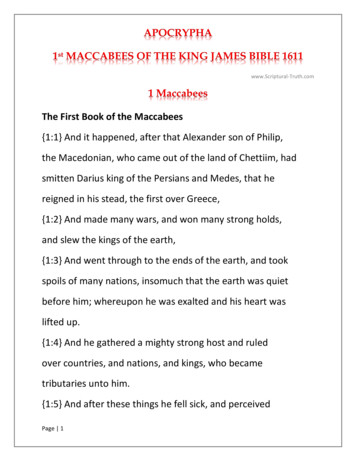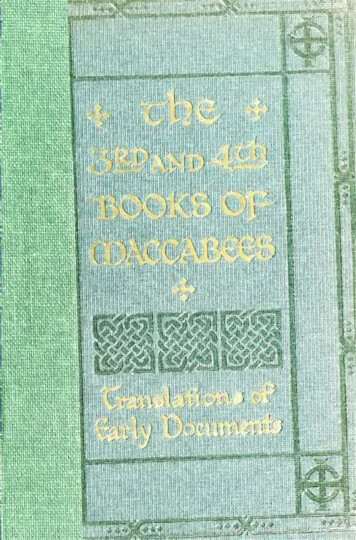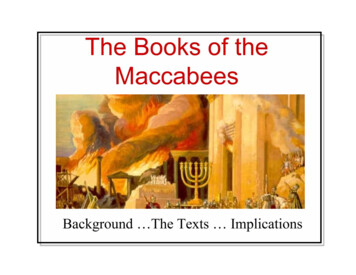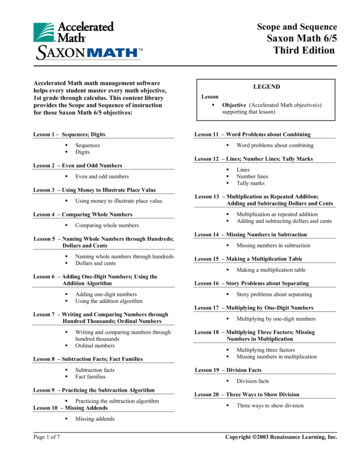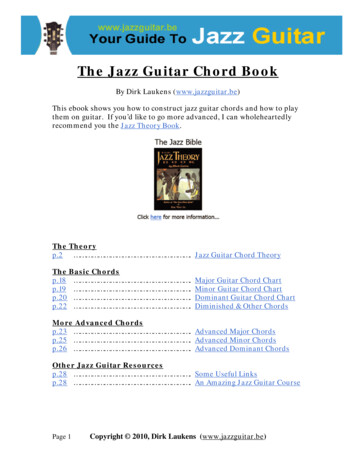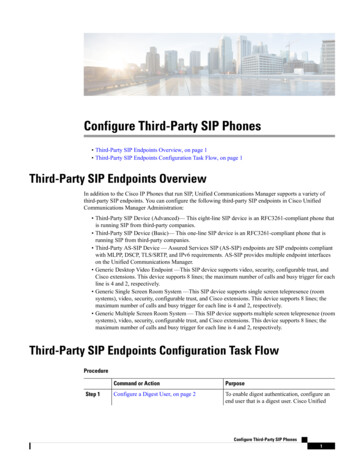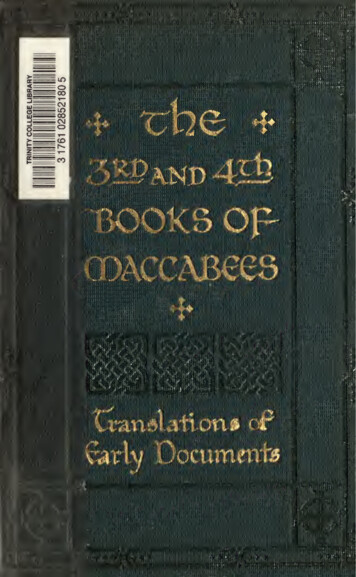
Transcription
c.w. EMMET,,VICAR>OFvfesT ftvsyiJ D,B.D.IWRItS. uJ".i"LON.DON:SOCIETY FOR PROMOTINGCHRISTIAN KNOWLEDGENEW YORK: THE MACMILLAN1918CO.
s!JVJV
INTRODUCTIONCONTENTS OF THE BOOK.SINCE the story of 3 Maccabees is at onceunfamiliar and somewhat complicated, an outlinemay be useful. The book opens .with an account ofthe battls of Raphia, fougTflTBetween Ptolemy IV.,Philopator, and Antiochus III., the Great, in 217 B.C.Ptolemy after his victory" "proceeds to visit Jerusalem, insisting in spite of protests on entering theHoly Place (i. 6 29). Simon, the High-Priest, praysthat the desecration may be prevented (ii. 120),and Ptolemy is punished by a divine intervenOn histion, barely escaping with his life (21-24).return to Egypt he issues a decree in revenge,depriving the Jews of Alexandria of their citizenship unless they attach themselves to the worshipof Dionysus (25-33).He then proceeds to orderthat all Jews in his dominions shall be sent as\jprisoners to Alexandria (Ch. III.). Chapter IV.describes their cruel treatment and the execution ofthe decree.The king orders that on the followingday they shall all be trampled to death by infuriated elephants, but forgets all about his purpose,so that the massacre is postponed to the next day(v.1-22).Once more he changeshismind, but onthe third occasion the order is finally on the pointof being executed (23-51). Eleazar, an aged priest,
INTRODUCTIONviprays to God, and two angels are sent from heaven,terrify the king and his hosts and turn thewhoTheelephants against their keepers (vi. 1-21).king then becomes the protector of the Jews, andgrants them a seven days feast in celebration ofhe writes a letter vinditheir deliverance (2241);cating their loyalty (vii. 1-9), and gives them permission to return to their homes and take vengeanceon apostates (10-23).PURPOSE OF THE BOOK.\The primaryinterest of thebooklies inthe factan example of one type of apology putforth by Jewish writers in defence of their religionand independence. As soon as Judaism came intocontact with the Graeco-Roman world it tended to/that/Iitisbecome unpopular by reason of its exclusivenessand peculiarities; we see in Hi. 4 the kind of chargesbrought against it. Various methods of apologywere open. The best was the appeal to reason,which might convince the outsider of the legitimacy, if not of the superiority, of the Jewishposition. The Letter of Arts teas, 4 Maccabees, andthe writings of Philo are examples of this method.Another line was the appeal to history and facts.This included the argument, which found itsj1counterparttianity,religion *-iIthatamongthe early apologists for Chrismembers of the suspectedafter allmake good andloyal citizens;3Mac-cabees emphasizes this point (iii. 5, vii. 7, 20).But still more obviously attractive was the warningthat in spite of the apparent defencelessness of theJews it was dangerous to interfere with them, sincethey had a supernatural ally who was ready toavenge their oppressors. The mainstress in 3Mac-
INTRODUCTIONj cabees lies on this side, and the king isas explicitly recognizing the lesson (vii.Esther, and Judith are other examplesof apology. In the last two books,viirepresentedDaniel,of this typethough thestory is improbable enough, it keeps within thelimits of the natural.This cannot be said of3 Maccabees, which turns not only on improbamiraculous interventionsbilities, but on direct(ii.21ff.,v.11,28, vi.6).i8ff.).The bookbesides being a warning to the outsider is also directed against heretics and backsliders within the nation.In itself it representsa strictly nationalistic and conservative type ofJudaism, sharply distinguished from all the postexilic developments and accretions with whichwe are familiar in other literature of this period./There are no intermediaries between God andIImanis mentioned but not personiangels do not appear exceptin the miraculous intervention of vi. iS, 1 and herethe angelic appearance is treated with a curiousreserve, being invisible to the Jews themselves.There is no reference to the Messiah, the Messianic age, or the future life.Proselytes are notdesiredPtolemy does not appear in any way asa convert. The sanctity and beauty of the Temple,representing the orthodox religion, are stronglyinsisted on, and lessons of encouragement aredrawn exclusively from the national history. Andso punishment falls on backsliders, especially onthose who showed any tendency to compromise withHellenism, a problem which became very urgentNo heresy-hunter couldin the second century B.C.fied.""providence;Demons and;1The repulse of Sennacherib, in vi. 5, is ascribed to GodHimself, not to the "angel of the Lord," as in 2 Kings xix.35-
INTRODUCTIONviiihave found any fault with the uncompromisingorthodoxy of the book.It may be added that the stress laid upon theFeasts observed in memory of the deliverance ofthe Jews (vi. 36 ff., vii. 19) suggests that the bookmay have been written in order to commend thekeeping of these Feasts and to be read at themevery year. In that case it falls into line withEsther and 2 and 4 Maccabees. See Introd. to4 Maccabees,p. xii.DATE ANDORIGIN.There are obvious points of contact betweenbook and 2 Maccabees. Many of the leadingThe repulse ofideas and incidents are the sameHeliodorus (2 Mace. iii. 22-31), and the punishment of Antiochus (ix. 4 ff. cf. 3 Mace. ii. 21-24)miraculous visions (iii. 25, x. 29, xi. 8; cf. 3 Mace.stress on the sanctity of the Temple andvi. 1 8)forits defence (iii. 1522, viii. 24, xiv. 34prayersattacks on reli36; cf. 3 Mace. i. ii ff., ii. i ff.)this:;I;;gion (vi. 9, etc.; cf. 3 Mace. ii. 27 ff, iii. 21attempts to enforce an alien citizenship (iv. 9 cf.;;stress laid on memorial feasts (x. 6,Mace. vi. 30-36). An aged and piousEleazar appears in both books (vi. 18 cf. 3 Mace.3 Mace, ib.}xv. 36cf. 3;;;vi.i)i6ff.;official;cf.3Mace.iii.I2ff,of the general horror in3Mace.i.i6ff,includedletters areiv.(ix.i8ff., xi.iff); the pictureI5ff. is like that invii.iii.3-8.The resemblances extendalsotostyleandlanguage, though the style of 2 Maccabees is farless involved and exaggerated.Again, there aresimilar points of connexion both in purpose andidea, and also in vocabulary, with the Letter of
INTRODUCTIONixArt s teas. And lastly, a comparison of the officialand technical language, especially in the king sletters and decrees, shows a rather striking agreement with data afforded by the papyri of thePtolemaic period. 1 There is not sufficient evidenceto justify us in assuming any direct connexioneither with 2 Maccabees or the Letter of Aristeas,(but the resemblances do suggest that our bookibelongs to the same school and period. We maydate it c. 100 B.C., and connect it with hereforeIAlexandria, though, as has already been pointedno traces of the distinctive AlexanIt may be noted that this wasdrian theology.the period when Jewish apologetic literature wasmost in vogue, and it is interesting to find anexample of it which shows no inclination to compromise in any direction with the surroundingHellenism. The author is quite unknown.Of alternative dates the most important is thatassigned to the book by Ewald, who connects itwith the attempt of Caligula to place his imagein the Temple, and with the persecutions of theAlexandrian Jews which took place in his reign(see Philo, adv. Flaccum and Legatio ad Caium}.the parallels are not really close, and thecharacteristic features of the Caligula story are!Butabsent, while the tone of 3 Maccabees points toa period of triumph and prosperity. On the otherhand, the positive indications, derived from lanout, there areand the literary resemblances, allto point to the earlier date.combineIguage1For evidence of the conclusions stated in this and thefollowing sections reference may be made to the writer sedition of 3 Maccabees in Charles Apocrypha and Pseudepigrapha of the Old Testament, vol. i., where full lists ofwords and details are given.
xINTRODUCTIONHISTORICAL BASIS.While the account of(a) Relation to Polybius.the battle of Raphia agrees generally with thenarrative of Polybius v., there are numerous differences for which there is no obvious reason (seenotes on ch. i.).Can these be traced to anyThe present writerspecial source or authority?believes that there is good reason to suppose thatthey are derived from the Memoirs of PtolemyMegalopolitanus, who wrote an account of thereign of Philopator, by no means favourable tothe king. This account seems to have been sometimes used by Polybius, and it is probable that itThe variaalso lies at the back of 3 Maccabees.tions already referred to in the story of the battleof Raphia, the rather detailed and very unflatteringpicture of the court of the king, and the conception of his vacillating character, may all comefrom Megalopolitanus. Amongst the stories toldby him there may well have been some which apious Jew could adapt to the glorification of his.I\;nation.In c. Ap. ii. 5 Josephus(b] Relation to Josephus.has in close connexion two stories which correspond to the two main themes of 3 Maccabees.He speaks of a visit made to Jerusalem byEuergetes I. to return thanks for his successes. Hethen goes on to narrate how after the death ofPhilometor the Jews of Alexandria supportedCleopatra against her brother Physcon (PtolemyThe latter on his accession exIX., 146-117).posed the Jews and their families to drunkenelephants, which turned on his followers and slewmany of them.phantom also appeared tothe king, which "prohibited his hurting" them.A
INTRODUCTIONThereisclearlyxisome connexion between the twostories, and Josephus s version is the more probable,both in the motive assigned for the attemptedmassacre and in the general absence of miraculousIt has, however, been suggestedembellishments.by Mahaffy and others that Josephus was wrongin placing the incident in the reign of Physcon,on the ground that, according to the evidence ofThis evidence,papyri, he treated the Jews well.however, refers to the latter part of his reign, andJosephus himself implies that he finally became aprotector of the Jews, so that there is no realIt is therefore probable thatcontradiction.the writer of 3 Maccabees (of course using some earlier/source than Josephus) deliberately transferred the/incident to an earlier reign.He had an obviou4In the story as told by Jose4reason for doing so.phus, the Jews, though preserved and vindicated,!did in fact take the losing, and therefore the wrong,For his purpose it was better to place the;side.whole incident in a more distant setting, where;it would be possible to exhibit them as altogether*blameless. Visits to Jerusalem may well have been*made both by Philopator and by Euergetes. Such ja visit is at any rate quite in place in the reign offHe was interested both in religion;the former.and in architecture, and in his triumphal progress after the battle of Raphia it is not likely that heshould have omitted the Jewish capital. The storyof 3 Maccabees at this point may in fact havebeen derived in substance from the Memoirs ofMegalopolitanus.The aim and the method of the writer seemthen to have been to combine in a single pictureasmanyfeatures as possible,glorificationoftheJewishalltending to the:nation.Wehave
INTRODUCTIONxiithe frustrated attempt to enter the Temple, with theemphasis laid on its beauty and sanctity, the miraculous preservation of the Jews, with the warningof the danger of attempting to interfere with themand the testimony paid to their loyalty, and finallythe denunciation and punishment of renegades andHellenizers.Subordinately there is the referencein i. 3 to the saving of the king s life by Dositheus,a Jew, though strangely enough he is admitted tobe a renegade. The picture is very confused details and the sequence of events are often unconvincing and there are gross exaggerations (e.g.iv. 3, 14 ff., 1 8), but taken separately there maywell be a core of historic fact in each one of the;incidents.Onthiswith someedited,tenciesii.viewbecomes unnecessarythe book has beento supposedrasticallycontains interpolations.The inconsiscontradictions, such as the reference initcritics thatandand25 to the companions"alreadymentioned,"whenthey have not been spoken of previously,are simply due to the writer s careless use of thevarious sources from which he has drawn his stories.in factThe same holds gooding;beenit isof the abruptness of the opennot probable that the true beginning haslost.STYLE.Theis rhetoricaland bombastic to athe sentences are full of repetitions andawkwardly constructed, with a marked absenceThe vocabulary shows aof connecting particles.fondness for rare or unique compounds and poeticalwords, and the result is very artificial, the numerousIn apurple passages quite failing to convince.word, the book is a specimen of the worst kind ofdegreestyle;
INTRODUCTIONpseudo-classicalism, a sort ofxiiiBaboo Greek, suchaswas not uncommon in the Hellenistic period. Inthe translation which follows no attempt has beenmade to conceal these features a smoother andmore literary rendering would have given a quite;falseimpression of the book.TEXT AND TITLE.Theistext, which is on the whole well preserved,in A. and V., and in many cursives of theThere is a free and extended version infoundLXX.the Syriac Peshitto, and also a loose, but literary,The book is not in the /Armenian translation.notanddoesVulgate,appear in the Roman or *English Apocrypha. There are very few earlyquotations from it, and these are confined toChristian writers of the Eastern Church.There is no obvious reason for the title Maccabees,and it may simply have arisen from its collocation with the other Maccabean books in the MSS.They may have been groupedtogether as dealingwith the origin of Feasts (see above, p. viii). Thereis some trace of a title Ptolemaica, which would bemoreaccurate.BIBLIOGRAPHY.The Greek text is accessible in editions of theSeptuagint, e.g. Swete, O. T. in Greek, vol. iii.an English translation in Churton, Uncanonical and Apocryphal Scriptures (1884).OfGerman editions reference may be made to Grimm,Handbuch zu den Apokryphen (1857) far tne fullest- and Kautzsch, Apokr. u. Pseudepigr. (1899).ThereisCritical inquiries in Schiirer, G. J. V. (1909)ii., iii.,iJ
INTRODUCTIONxivpp. 493 ff. [Eng. trans, ii., iii., pp. 2i6ff.]; Swete,Intr. O. T. in Greek (1902), pp. 278 ff.Abrahams,/. Q. R., ix., pp. 39 ff.Mahaffy, Empire of thePtolemies, pp. 267 ff., and Ptolemaic Dynasty(vol. iv. of Petrie s Hist. Egypt], chs. v., viii.;;;Biichler, Tobiadenund Oniaden,pp. I72ff.The most recent edition is that by the presentwriter in Charles Apocrypha and seudepigrapha ofPtheOld Testament (Oxford,1913), vol.i., pp. 155been said, referenceevidence of positions taken173, to which, as has alreadymaybe madefor fullIntroduction and the following notes.The translation is reproduced by kind permissionof the Oxford University Press.upinthisWords inserted in the translation for the sake ofclearness are printed in italics.
THE THIRDBOOK OF MACCABEESI.1-8.TheBattle of Raphia.Now whenPhilopator had learned from thosereturned of the capture by Antiochus ofthe places which had been held by him, he issuedorders to all his forces, foot and horse, and takingwith him his sister Arsinoe, marched to the districtover against Raphia, where the army of Antiochusi.who hadI. i. Philopator, t. e. Ptolemy IV. (222-204 B.C.).Justinusnoctes in stupris, dies in conviviis consumit," asays of himcharacter which agrees completely with the picture given ofhim in this book. He therefore caused great astonishmentwhen he suddenly asserted himself and recovered Palestinefrom his formidable rival Antiochus III. the Great (224-187),by the victory of Raphia (217 B.C.). The book opens with abrief account of the battle, which is in general agreement withthe account given by Polybius (v. 40 ff. ; 82 ff.). Accordingto the latter the armies reach Raphia at the same time, andArsinoe s encouragement comes before the battle ; at thecrisis it is the king himself who changes the fortune of theAs has been pointed out in the Introduction, theseday.variants are probably derived from the lost Memoirs ofPtolemy Megalopolitanus. The abruptness of the openingand the details of the first few verses can indeed only beexplained by supposing that the writer was following somesuch source, since they have nothing to do with the rest ofthe book.His sister Arsinoe." This is correct at the date of thebattlelater, following the Egyptian custom, she became"";PtolemyThes wife.battle ofRaphiaisreferred to in15Dan.xi.n,12,
was encamped.2. But a certain Theodotus, determining to carry out his plot, took with him thebravest of the soldiers of Ptolemy who had beenpreviously assigned to him, and went by night tothe tent of Ptolemy, intending to kill him singlehanded, and thereby put an end to the war. 3. ButDositheus, called the son of Drimylus, who wasby birth a Jew, but had subsequently abandonedthe observance of the law, and renounced his ancestralfaith, had conveyed Ptolemy away, and put someobscure person to sleep in the tentand so it;happened that onthisintended for the other.man4.fellAndthe vengeancewhen a fiercehad begun, and things were favouring Antiochus, Arsinoe went frequently up and down thebattlethem withlamentation and tears to fight manfully for themselves, their children, and their wives, promising togive them if they conquered two minae of goldeach.5. And thus it came about that their adversaries were destroyed in the encounter, and thatmany were also taken captive. 6. So Ptolemy,ranks, and, her hair dishevelled, exhortedThis attempt of Theodotus is narrated by Polybiusand once more there are minor differences. In parThe savingticular Dositheus is not mentioned by Polybius.of the king s life by the loyalty of a Jew is in keeping with theIn view of his hostilitywriter s main purpose (Intr. p. vi).to renegades it is strange that Dositheus should be so described.Either the fact was mentioned in the source, or heregarded any one employed in a pagan court as so far anIt may be noticed that a Dositheus is mentionedapostate.in Jos., c. Ap. ii. 5, as a Jewish general who did good serviceIn Ap. and Pseud, ofto the Ptolemies (see Intr. p. xii).O.T., i. p. 1 60, details will be found of others of the samename who played similar parts, and of possible identifications.6. Polybius refers to the ready submission of the cities ofCoele-Syria and to Ptolemy s visits, laying stress on their2.(v. 81),gifts tohim.
PHILOPATOR AT JERUSALEM17having crushed the attack, determined to visit theneighbouring cities, and encourage them. 7. Andhaving done this, and given gifts to their shrines,he inspired his subjects with confidence. 8. Andwhenthe Jews had sent to him some of the senateand elders to greet him, and bring him gifts, andcongratulate him on what had happened, he becamethe more eager to visit them as quickly as possible.9-29.Philopator attempts to enter theHoly Place.9. And when he had come to Jerusalem he sacrificed to the Most High God and offered thankofferings, acting in some measure according towhat was suitable to the place. And entering intothe holy place, and being struck by the care//ajW, and the beauty, 10. and admiring also thegood order of the temple, it came into his mindto purpose to enter into the sanctuary,u. Andwhen they said that this was not allowed, sincenot even members of their own nation could enter,or all the priests, but only the High-Priest whowas chief of all, and he once a year, he was by no12. And when the law hadmeans convinced.been read out to him, not even then did he desistfrom his claim that he himself should enter, saying,Even if they are deprived of this honour, I mustnot be so. 13. And he asked why, when he enteredinto every shrine, none of those present hindered<afo-him?14.And some one answeredthat he did wrong tosince this is so, he said,any15.case,Thewhether they wishgeneral meaningtranslation are doubtful.thoughtlesslymake this boast.why should I notisitor not?clear,116.though the5.Butenter inThentextand
THE THIRD BOOK OF MACCABEES18the priests in all their robes fell down, and besoughtthe Most High God to aid them in that which hadcome upon them, and to turn the violence of himwho was making this wicked attack, filling thetemple with lamentation and tears 17. and thosewho were left in the city hurried forth in confusion,concluding that something strange was happening.1 8.The virgins who had been shut up in theirchambers rushed forth with their mothers, and,covering their hair with dust and ashes, filled thestreets with groanings and lamentations.19. Andthose who had been lately married, leaving thechambers prepared for wedded intercourse andforgetting their proper modesty, ran about in confusion through the city.20. And as for the newborn children, the mothers and nurses who hadcharge of them, left them here and there, in thehouses or in the streets without care, and camein crowds to the temple which is high above all.21. And manifold were the supplications of thosegathered here because of the impious enterpriseof the king.22. And with them the bolder fromamong the citizens would not endure his carryingthe matter to an extremity, or his determinationto complete his project23. but calling on oneanother to rush to arms, and to die bravely for thelaw of their fathers, they made great confusionin the place, and being with difficulty turned fromtheir purpose by the elders and the priests they24. And thejoined in supplication with them.multitude continued meanwhile praying as before.25. But the elders who were with the king triedin many ways to turn his haughty mind fromthe purpose he had conceived.26. But being;;18, .For the general
PRAYER OF SIMON19emboldened and now setting them all aside, hewas even beginning to approach, thinking that hewould complete the design aforesaid. 27. Therewho were with him, seeing this, joinedown people in beseeching him who hasfore thosewith ourall power to defend them in their present need,and not to disregard the lawless and insolent deed.28. So incessant and vehement was the united cryof the multitude that an indescribable uproar arose.29. For it might have been thought that not onlythe people, but even the walls and the whole pavement were crying out, since all preferred death tothe profanation of the holy place.1-20.II.PrayerofSimon.i. Thenthe High-Priest Simon, bowing hisknees before the holy place, and spreading outhis hands in calm reverence, prayed after thismanner 2. Lord, Lord, King of the heavens, andsovereign of all creation, holy among the holyones, only ruler, almighty, give ear to us who aregrievously troubled by one wicked and profane,:made wanton in insolence and might. 3. For thou,who hast created all things, and governest thewhole world, art a righteous ruler, and judgestwho do aught in violence and arrogance.thoseII. i. Simon II., son of Onias I., High-Priest 219-19960.The whole verse is absent from the best Greek MSS., sothat there is some doubt as to whether he was originallymentioned here.2. "Holy among the holy ones" occurs in combinationwith Isa. Ivii. 15 in the Liturgy of St. Clement. The longstring of attributes of God was a characteristic feature of theprayers of Hellenistic Judaism, cf. ii. 21, v. 7, vi. 2-9, 18, 28;2Mace.i.24 Pr.Man.1-4.
THE THIRD BOOK OF MACCABEES204.Thoudidstdestroy thosewhoaforetime didwhomwere giants trusting ininiquity, amongtheir strength and boldness, bringing upon thema boundless flood of water.5. Thou didst bumup with fire and brimstone the men of Sodom,workers of arrogance, who had become known ofall for their crimes, and didst make them an example to those who should come after. 6. Thoudidst try with manifold and grievous punishmentsthe insolent Pharaoh when he enslaved thy holypeople Israel, and didst make known thy mighty7. And when he pursued with chariotspower.and a multitude of peoples thou didst overwhelmhim in the depth of the sea, but those who trustedin thee, the ruler of all creation, thou didst bring8. And they seeing the works ofsafely through.thy hands did praise thee, the almighty. 9. Thou,O King, when thou didst create the boundlessand measureless earth, didst choose this city andsanctify this place [for thy name] for thyself, whohast need of nothing, and didst glorify it by asplendid manifestation, establishing it to the gloryof thy great and honourable name.10. Andloving the house of Israel, thou didst promise thatif there should be a falling away, and distressus, and we should come to thisplace and make our supplication, thou wouldesthear our prayer,n. And indeed thou art faithfuland true.12. And seeing that oftentimes whenour fathers were afflicted thou didst succour themin their humiliation, and didst deliver them fromshould overtake4. Refs. to the Giants are frequent, especially in the Apocalyptic Literature, but see also Sir. xvi. 7, Wisd. xiv. 6, Judithxvi. 7.In 2 Pet. ii. 5-6 we have the angels, the flood, andSodom.10.iKingsviii. 33.
PUNISHMENT OF PHILOPATOR21Ogreat evils, 13, behold now,holy King, for ourmany great sins we are grievously troubled andput into subjection to our foes, and faint in ourweakness.14. In our low estate this insolent andprofane man seeketh to do violence to the holyplace which is consecrated upon earth to the nameof thy glory.15. For man cannot reach thy16. Butdwelling place, the heaven of heavens.since thy good pleasure was in thy glory amongstthy people Israel, thou didst hallow this place.17. Punish us not by the uncleanness of thesemen, neither chastise us by their profane doings,lest the transgressors boast in their wrath or exultin the insolence of their tongue, saying, 18.have trodden down the house of the sanctuary asthe houses of the abominations are trodden down.sins and scatter abroad our19. Blot out ouroffences and manifest thy mercy at this hour.We20. Let thy compassion speedily overtake us, andput praises in the mouth of the fallen and brokenin heart, granting us peace.21-24Punishmentof Philopator.Then the God who beholds all, the Father ofall, holy among the holy ones, hearing the supplication spoken according to the law, scourged him who21.was greatly uplifted in violence and insolence, 22.shaking him to and fro as a reed by the wind, sothat lying on the ground powerless and paralysedin body he could not so much as speak, being18. "Abominations" is of course out of place as part ofthe boast of heathen speakers.21 ff.Cf. the punishment of Heliodorus in 2 Mace. iii.22-30, and of Apollonius in 4 Mace. iv. u, also the illness ofAntiochusin 2Mace.ix. 4.
THE THIRD BOOK OF MACCABEES22smitten by a righteous judgment. 23. Whereuponhis friends and body-guard seeing that the chastisement which had overtaken him was swift, and fearing lest he should even die, speedily drew him out,being overwhelmed by an exceeding great fear.24. But having after some time recovered himself,he by no means came to repentance though hehad been thus punished, but departed with bitterthreats.25-33.Measures taken against theAlexandrian Jews.25. So, arriving in Egypt, and going on furtherin his wickedness, through his boon companionsassociates, who have been already mentioned,utter strangers to all justice, 26. he was not conandtent with his countless excesses, but even reachedsuch a pitch of insolence that he raised evilreports in those parts, and many of his friendswatching carefully the royal purpose, themselvesalso followed his will.27. He purposed publiclyto inflict a disgrace upon the Jewish nation, anderected a pillar on the tower in the palace with the28. That none who did not sacrificeshould be allowed to enter their temples and thatinscription,;25.28."Already mentioned"i. e.:Where?Only those who conformedSeeIntr. p. xii.to the officialworshipmight continue the practice of their own religion, a conditionFor attempts to make theobviously aimed at the Jews.Jews conform to the official religion as a condition ofc. Ap. ii. 6.citizenship, see Jos., Ant. XII. iii. 229. Bacchus seems to have been the family God of thePtolemies, and Philopator was himself apparently brandedwith the ivy-leafsee Philo de Man. i. 8 for Jews whoallowed themselves to be branded.In 2 Mace. vi. I wehave an account of the attempt of Antiochus to introduce theworship of Dionysus into Jerusalem.;;
MEASURES AGAINST THE JEWS23Jews should be degraded to the rank of nativesand the condition of serfs, and that those who spokeagainst it should be taken by force and put todeath29. and that those who were registeredshould even be branded on their bodies with anivy-leaf, the emblem of Dionysus, and be reducedto their former limited status.But that he30.might not appear an enemy to all, he added, Butif any of them prefer to join those who are initiatedinto the mysteries, they shall have equal rights withall;the citizens of Alexandria.31. Some obviously hating the price paid for thereligion of their city readily gave themselves up,expecting to gain great glory from their associationwith the king.32. But the greater part stood firmwith a noble courage, and departed not from theirand paying money as a ransom for theirreligionlives fearlessly attempted to save themselves fromthe registration.33. And they remained of goodshouldfind help, and abhorredthattheyhopethose who parted from them, accounting them as;30. Josephus frequently states that the Jews of Alexandriapossessed full citizen rights before this period, but the wholequestion is obscure. Apparently whatever rights they enjoyed were granted to them as individuals, not as a nation,and it is doubtful how far they extended beyond Alexandria.There are, in fact, traces of an edict of Physcon by whichEgyptians and Syrians (Jews) were granted the rights ofAlexandrian citizenship at a later period ; i. e. there wasprobably always
vi INTRODUCTION praystoGod,andtwoangelsaresentfromheaven, whoterrifythekingandhishost
